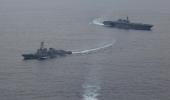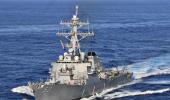National Security Advisor Ajit Doval on Thursday called for seamless coordination among various agencies involved in protecting India's maritime interests in the face of emerging security challenges and increasing rivalries and competitions in the Indian Ocean.

In his address at the first-ever meeting of the Multi Agency Maritime Security Group (MAMSG), Doval said there must be common protocols, standard operating procedures and operational framework among various stakeholders, noting that India will not be able to become the power it deserves to be in absence of a very strong maritime security apparatus.
India's security planners have consistently been pressing for a coordinated approach in dealing with maritime security challenges following the 26/11 Mumbai terror attacks 14 years ago when a group of sea-borne terrorists struck at the heart of the country's financial capital.
Doval said the National Maritime Security Coordinator (NMSC) should be the focal point to bring in synergy in maritime security domain and galvanise coordination in various aspects including operational matters.
In the context of changing geopolitical scenario, Doval said that the Indian Ocean, which has been an "ocean of peace", is witnessing increasing rivalries and competitions and India needs to protect its interests as the region has the potential to witness clash of interests.
His comments came amid growing concerns over China's increasing forays into the Indian Ocean, considered the backyard of the Indian Navy.
The meeting was chaired by Vice Admiral G Ashok Kumar (Retd), the country's first NMSC, a post created with a mandate to ensure coordination among various key stakeholders with an overall objective to strengthen the country's maritime security.
The meeting was attended by top maritime and coastal security brass from all 13 coastal states and Union territories as well Indian Navy and other central agencies.
Doval said security at the high seas and economic wellbeing is inextricably linked and all stakeholders must work unitedly.
"The trajectory of this nation is well defined. We know where we are going. Our time will come...We as a nation have to be strong. India will not be able to become the power it deserves to be unless it has a very strong maritime system," Doval said.
Describing the Indian ocean as a "great asset" for India, Doval said the country's vulnerabilities are directly proportional to its assets and that India's responsibility as a premier maritime power is extremely important.
"More we develop, the more assets we create, the more prosperous we get, greater would be the vulnerability and the need for security in the maritime domain," he said.
In national security discourse, the importance of land and maritime borders are very different, Doval said, adding one cannot fence the maritime borders and that the disputes in seas are resolved under the framework of international laws while land disputes are bilateral in nature.
"Conventional borders had their pre-eminence because wars were fought on the land borders, but maritime and land borders are different. Maritime borders cannot be fenced… We can't have the concept of zero percent tolerance for intrusion. So, we need to have technology and other ways to counter this," he said.
He also said denying accessibility to foreign intelligence agencies looking to undertake espionage activities is a major challenge.
Doval referred to initiatives like the Colombo security conclave for cooperation among the like-minded countries in the maritime domain and that it could be expanded further.
"Our responsibility as a premier maritime power is extremely important," he said.
"In the changing geopolitical scenario, the Indian Ocean which has been an ocean of peace is gradually becoming competitive. We see a potential of having a clash of interest, we need to protect it and be vigilant," he said.
In his remarks, Doval referred to the 26/11 Mumbai attack while underlining the importance of the National Maritime Security Coordinator (NMSC).
He said the standard operating procedures need to be built and all the stakeholders and agencies need to speak the same language in dealing with maritime security challenges.
There is a requirement of a common operational picture, coordination has to be in an actionable fashion, Doval said, noting that "access to the data banks that we have at various levels are very important".
"A well-integrated system is needed. From the beat constable to the officers at the national level, everyone has a critical role to play. Any lapse anywhere can be a problem," he said.
There is a requirement of standardisation of protocols, SOPs which need to be made through consensus. The NMSC's doors will always be open for each one of you, he noted.
Doval also said that India has certain responsibilities towards its maritime neighbours in areas of disaster management and security.
In a major decision to reform coordination of maritime security affairs at the apex level, the Union Cabinet in November last year approved the creation of the post of NMSC under the NSA.
With this decision, a longstanding recommendation of the 2001 Group of Ministers (GOM) report on 'Reforming the National Security System' was implemented.
Kumar assumed charge as the country's first NMSC on February 16.
The MAMSG is envisaged to provide a standing and effective mechanism to ensure coordination of all aspects of maritime security including coastal and offshore security, as well as fill the institutional, policy, technological and operational gaps in meeting present and future security challenges. The group will also address maritime contingencies requiring an urgent and coordinated response, officials said.











 © 2025
© 2025